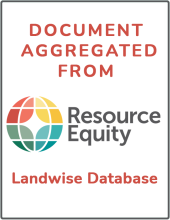Land Library Search
Through our robust search engine, you can search for any item of the over 73,000 highly curated resources in the Land Library.
If you would like to find an overview of what is possible, feel free to peruse the Search Guide.
/ library resources
Showing items 1 through 9 of 104."Agricultural research has greatly increased the yields of important staple food crops, and for many people this has meant more food availability and trade opportunities. Yet many people in rural areas in developing countries still live in abject poverty.
Agricultural growth will prove essential for improving the welfare of the vast majority of Africa’s poor. Roughly 80 percent of the continent’s poor live in rural areas, and even those who do not will depend heavily on increasing agricultural productivity to lift them out of poverty.
This brief considers the benefits and costs of alternative tenure and institutional arrangements and the impact of existing legal and policy frameworks on the sustainability and equity of pastoral production systems under three categories of landownership: (1) state ownership; (2) individual owne
This study analyzes the links between risk and the kinds of property rights that have evolved to provide the mobility necessary to raise livestock in drought-prone countries--in this case Burkina Faso, Ethiopia, and Niger.
This report focuses on the sustainability of pastoralism in the lowlands of the Great Rift of East Africa and the Horn, arguing that pastoralism as a mode of production and a way of life has entered a phase of decline, often accompanied by conflict, drought, famine and flooding.The report details
This book, prepared by the Philippine Environmental Governance Project, serves as a reference guide for field personnel in guiding communities, investors, local government units, private persons and other organisations desiring to apply for tenure instruments on forest lands.The book covers all e
This paper examines how, over the past 10 years, Kyrgyzstan has privatised most of its agricultural land and distributed it to individual households. These households either farm alone or join together and farm cooperatively.
This paper assess Uruguay’s greenhouse gas emissions and economic performance, in addition to reviewing policies, plans and regulations which have resulted in land use changes and new forested areas with significant implications for climate change.



